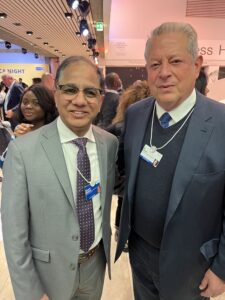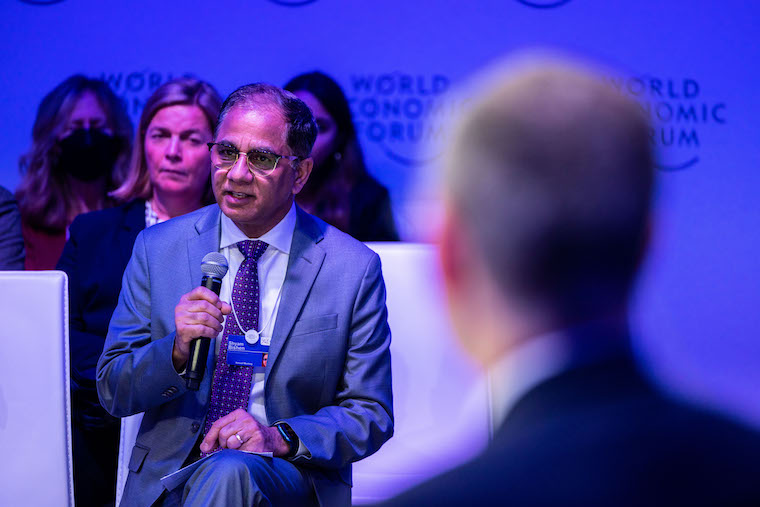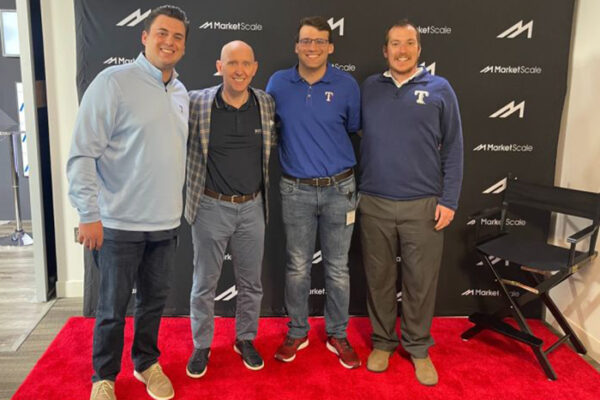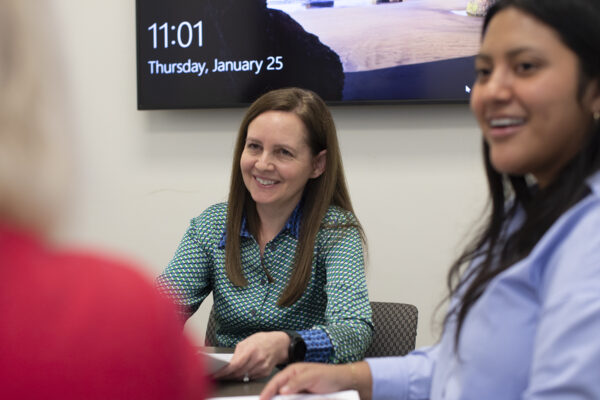As the world turned its eyes to Davos, Switzerland, in January to see global leaders convene at the World Economic Forum’s annual meeting, Shyam Bishen, PMBA ’99, turned his attention to the task at hand. Sitting down with dignitaries including Brazil’s minster of health, the president of the National Academy of Medicine, the climate and health special envoy of the World Health Organization, and the CEO of Bayer AG, Bishen discussed the current and future impacts of climate change on human health. The topic is a focus area for the forum’s Centre for Health and Healthcare, which Bishen has headed since 2022.
“Levels of respiratory, cardiovascular and infectious diseases are all growing because of climate change and global warming,” Bishen says. “We now have mosquitoes and vector-borne diseases in places that never saw such things before. How do we prepare the health system for that? How do we come up with new treatments that are suitable for the locations that are going to be most impacted by climate change?”

Addressing these enormous challenges will require a massive global investment — the Centre for Health and Healthcare estimates a $1 trillion price tag in the coming decades — and new technologies. Bishen sees promise in an AI-powered early-warning system that could better predict extreme weather events like wildfires and tropical storms and their health impacts, for example. But any effective measures will require global collaboration.
That’s where the World Economic Forum (WEF) steps in. Since 1971, the WEF has brought together leaders in government, industry, civil society and academia to seek solutions to problems that can’t be addressed within a single sector. Alongside climate and health, the Centre for Health and Healthcare is working toward solutions in AI and digital health care, pandemic preparedness and more.
Bishen’s path to the WEF began in his home country of India, where he saw early on the effects of an inequitable global health system. After moving to Australia and earning a doctorate in chemical sciences from the University of Newcastle, he launched a scientific career at Monsanto and in the pharmaceutical industry.
While living in St. Louis during his stint at Monsanto, Bishen met with the faculty at Olin Business School. He was so impressed by their MBA curriculum that he enrolled for another graduate degree, and he now views his time at WashU as a pivotal moment in his leap into the business and strategy side of health care.
“At WashU, I had a very rich experience. I learned about strategic thinking, management and how to think in terms of a business leader,” Bishen says. “An ability to bring my technical experience and business knowledge together to think about bigger issues has helped me make an impact and get things done.”
After earning an MBA, Bishen worked as a VP at the pharmaceutical company Merck, focusing on emerging markets. Then in 2015, when the Bill & Melinda Gates Foundation approached him with an offer to become a regional director, Bishen leapt at the opportunity. With the foundation, he traveled to Africa, Southeast Asia and Latin America to better understand the reality on the ground. When COVID hit five years later, Bishen’s experience with pharmaceuticals and global markets proved invaluable. Under his watch, the Gates Foundation helped lead the effort to bring affordable vaccines and therapeutics to low- and middle-income countries.
“If we target 10 things that have huge potential to impact global health, even if two or three things work, that will be a huge success.”
Shyam Bishen
In his widespread efforts to save lives, Bishen looks beyond the impact of current companies and governments. He sees education, in particular the education of women and girls in developing countries, as crucial to improving health. In 2019, he and his wife launched the nonprofit Global Girls Scholarship Foundation. The organization has funded scholarships and provided academic resources to numerous girls in India, Kenya and Malawi, and they look to scale up the program in the coming years.
Whether staring down multiple global health crises or building a nonprofit, Bishen says it’s important to think big, think strategically and, perhaps most important: “Don’t be afraid to fail.”
“Some days are very encouraging, and I’m very optimistic. But then there are days when we see setbacks,” Bishen says. “I have accepted that as the nature of my job. If we target 10 things that have huge potential to impact global health, even if two or three things work, that will be a huge success — personally for me and, more importantly, for the people we are working to help around the world.”



